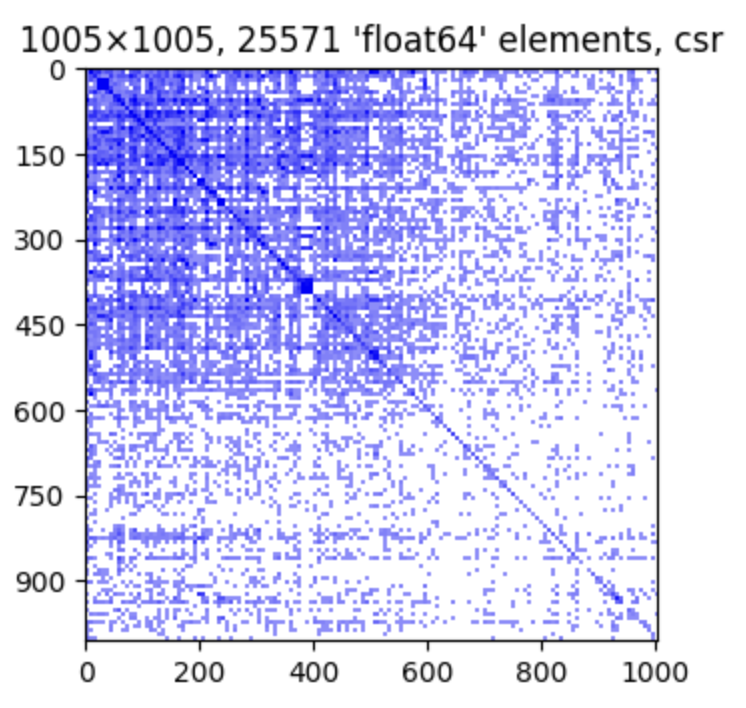Sparse matrix spy plot, HTML, and LaTeX rendering with Jupyter integration.
Project description
MatSpy
Sparse matrix spy plot and sparkline renderer.
Supports:
scipy.sparsesparse matrices and arrays likecsr_matrixandcoo_array.
For HTML/LaTeX see MatRepr.
Quick Start
pip install matspy
from matspy import spy
spy(A)
See a Jupyter notebook demo.
Methods
spy(A): Plot the sparsity pattern (location of nonzero values) of sparse matrixA.to_sparkline(A): Return a small spy plot as a self-contained HTML string.spy_to_mpl(A): Same asspy()but returns the matplotlib Figure without showing it.to_spy_heatmap(A): Return the raw 2D array for spy plots.
Arguments
All methods take the same arguments. Apart from the matrix itself:
title: string label. IfTrue, then a matrix description is auto generated.indices: Whether to show matrix indices.figsize,sparkline_size: size of the plot, in inchesshading:binary,relative,absolute.buckets: spy plot pixels (longest side).dpi: determinebucketsrelative to figure size.
Overriding defaults
matspy.params contains the default values for all arguments.
For example, to default to binary shading, no title, and no indices:
matspy.params.shading = 'binary'
matspy.params.title = False
matspy.params.indices = False
Jupyter
spy() simply shows a matplotlib figure and works well within Jupyter.
to_sparkline() can create small matrix visualizations that work anywhere HTML is displayed.
Multiple sparklines can be automatically to-scale with each other using the retscale and scale arguments.
Fast
All operations work with very large matrices. A spy plot of tens of millions of elements takes less than half a second.
Large matrices are downscaled using two native matrix multiplies. The final dense 2D image is small.

Spy Plot Anti-Aliasing
One application of spy plots is to quickly see if a matrix has a noticeable structure. Aliasing artifacts can give the false impression of structure where none exists, such as moiré or even a false grid pattern.
MatSpy employs some simple methods to help eliminate these effects in most cases.
See the Anti-Aliasing demo for more.
How to support more packages
Each package that MatSpy supports implements two classes:
Driver: Declares what types are supported and supplies an adapter.get_supported_type_prefixes: This declares what types are supported, as strings to avoid unnecessary imports.adapt_spy(A): Returns aMatrixSpyAdapterfor a matrix that this driver supports.
MatrixSpyAdapter. A common interface for extracting spy data.describe(): Describes the adapted matrix. This description serves as the plot title.get_shape(): Returns the adapted matrix's shape.get_spy(): Returns spy plot data as a dense 2D numpy array.
See matspy/adapters for details.
You may use matspy.register_driver to register a Driver for your own matrix class.
Project details
Download files
Download the file for your platform. If you're not sure which to choose, learn more about installing packages.
















